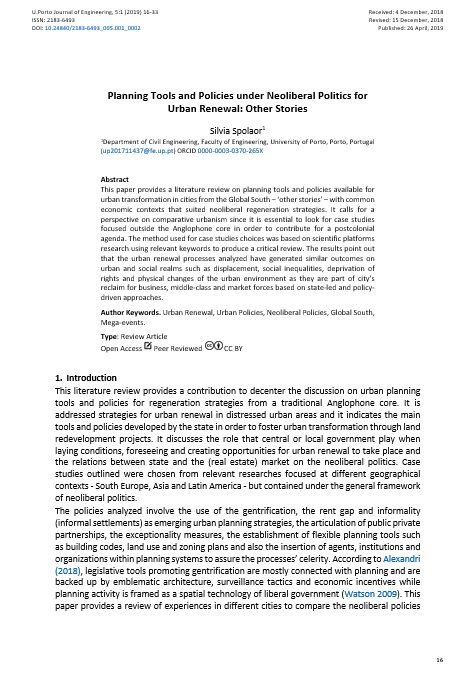Planning Tools and Policies under Neoliberal Politics for Urban Renewal Other Stories
Main Article Content
Abstract
This paper provides a literature review on planning tools and policies available for urban transformation in cities from the Global South – ‘other stories’ – with common economic contexts that suited neoliberal regeneration strategies. It calls for a perspective on comparative urbanism since it is essential to look for case studies focused outside the Anglophone core in order to contribute for a postcolonial agenda. The method used for case studies choices was based on scientific platforms research using relevant keywords to produce a critical review. The results point out that the urban renewal processes analyzed have generated similar outcomes on urban and social realms such as displacement, social inequalities, deprivation of rights and physical changes of the urban environment as they are part of city’s reclaim for business, middle-class and market forces based on state-led and policy-driven approaches.
Downloads
Article Details
Authors who publish with this journal agree to the following terms:
- Authors retain copyright and grant the journal right of first publication with the work simultaneously licensed under a Creative Commons Attribution License that allows others to share the work with an acknowledgement of the work's authorship and initial publication in this journal.
- Authors grant the journal the rights to provide the article in all forms and media so the article can be used on the latest technology even after publication and ensure its long-term preservation.
- Authors are able to enter into separate, additional contractual arrangements for the non-exclusive distribution of the journal's published version of the work (e.g., post it to an institutional repository or publish it in a book), with an acknowledgement of its initial publication in this journal.
- Authors are permitted and encouraged to post their work online (e.g., in institutional repositories or on their website) prior to and during the submission process, as it can lead to productive exchanges, as well as earlier and greater citation of published work (See The Effect of Open Access).

